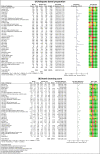Effectiveness of bowel preparation innovative technology instructions (BPITIs) on clinical outcomes among patients undergoing colonoscopy: a systematic review and meta-analysis
- PMID: 37402823
- PMCID: PMC10319802
- DOI: 10.1038/s41598-023-37044-w
Effectiveness of bowel preparation innovative technology instructions (BPITIs) on clinical outcomes among patients undergoing colonoscopy: a systematic review and meta-analysis
Abstract
To evaluate the effectiveness of bowel preparation innovative technology instructions (BPITIs) among patients undergoing colonoscopy. We searched PubMed, MEDLINE, CINAHL, CENTRAL, Scopus, Web of Science, LILACS, ClinicalTrials.gov, and Google Scholar for randomised controlled trials (RCTs) and cluster-RCTs from inception to February 28, 2022. The Cochrane risk of bias (RoB) tool and GRADE were used to assess RoB and certainty of evidence, respectively. Meta-analyses with random-effects model were used for analysis. This review included 47 RCTs (84 records). Seven BPITIs were found among included studies: (1) mobile apps, (2) VDO stream from personal devices, (3) VDO stream from a hospital device, (4) SMS re-education, (5) telephone re-education, (6) computer-based education, and (7) web-based education. The findings demonstrate that BPITIs have a slight impact on adherence to overall instructions (RR 1.20, 95% CI 1.13-1.28; moderate-certainty evidence), adequate bowel preparation (RR 1.10, 95% CI 1.07-1.13; low-certainty evidence), and quality of bowel preparation score (SMD 0.42, 95% CI 0.33-0.52; low-certainty evidence) compared to routine care. BPITIs may enhance the clinical outcomes. Due to the low-certainty evidence and heterogeneity of the included studies, the findings should be interpreted cautiously. Well-designed and reported RCTs are required to confirm the findings.PROSPERO registration number: CRD42021217846.
© 2023. The Author(s).
Conflict of interest statement
The authors declare no competing interests.
Figures






References
-
- WHO—World Health Organization GLOBOCAN—Colorectal cancer incidence in the world. Glob. Cancer Obs. 2020;419:1–2.
Publication types
MeSH terms
LinkOut - more resources
Full Text Sources
Medical

